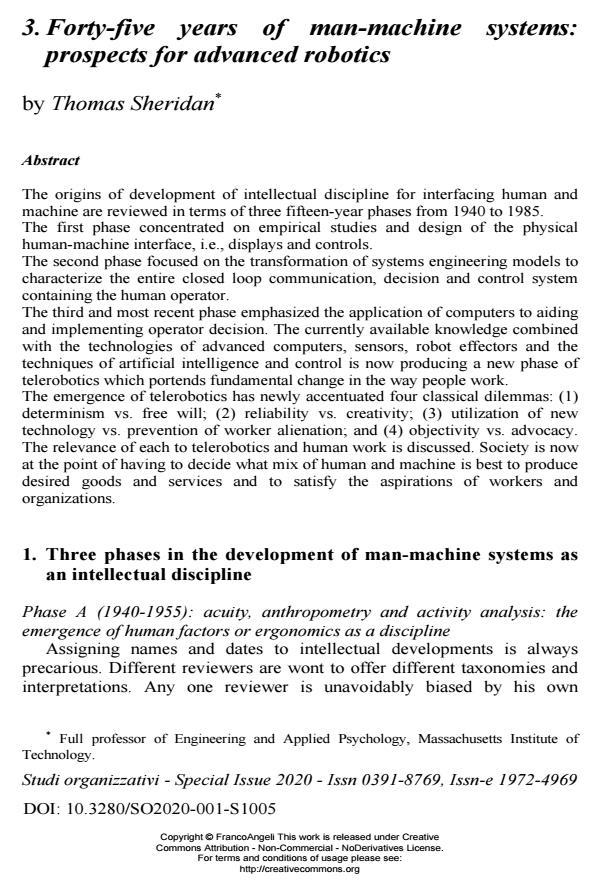Forty-five years of man-machine systems: prospects for advanced robotics
Titolo Rivista STUDI ORGANIZZATIVI
Autori/Curatori Thomas Sheridan
Anno di pubblicazione 2020 Fascicolo 2020/suppl. 1
Lingua Inglese Numero pagine 13 P. 73-85 Dimensione file 208 KB
DOI 10.3280/SO2020-001-S1005
Il DOI è il codice a barre della proprietà intellettuale: per saperne di più
clicca qui

FrancoAngeli è membro della Publishers International Linking Association, Inc (PILA)associazione indipendente e non profit per facilitare (attraverso i servizi tecnologici implementati da CrossRef.org) l’accesso degli studiosi ai contenuti digitali nelle pubblicazioni professionali e scientifiche
The origins of development of intellectual discipline for interfacing human and machine are reviewed in terms of three fifteen-year phases from 1940 to 1985. The first phase concentrated on empirical studies and design of the physical human-machine interface, i.e., displays and controls. The second phase focused on the transformation of systems engineering models to characterize the entire closed loop communication, decision and control system containing the human operator. The third and most recent phase emphasized the application of computers to aiding and implementing operator decision. The currently available knowledge combined with the technologies of advanced computers, sensors, robot effectors and the techniques of artificial intelligence and control is now producing a new phase of telerobotics which portends fundamental change in the way people work. The emergence of telerobotics has newly accentuated four classical dilemmas: (1) determinism vs. free will; (2) reliability vs. creativity; (3) utilization of new technology vs. prevention of worker alienation; and (4) objectivity vs. advocacy. The relevance of each to telerobotics and human work is discussed. Society is now at the point of having to decide what mix of human and machine is best to produce desired goods and services and to satisfy the aspirations of workers and organizations.
- Aitkenhead A.M., Slack J.M. (1985). Issues in Cognitive Modeling. London: The Open University.
- Edwards W. (1962). “Behavioral Decision Theory”. Annual Review of Psychology, 12: 473-498.
- Green D.M., Swets J.A., (1966). Signal Detection Theory and Psychophysics, New York: Wiley.
- James H.M., Nichols N.B., Phillips R.S. (1947). Theory of Servomechanisms. New York: McGraw Hill.
- McRuer D.T., Graham D., Krendel E., Reisener W. (1965). Human Pilot Dynamics in Compensatory Systems: Theory, Models and Experiments with Controlled Element and Forcing Function Variations. AFFDL-TR-65-15, Dayton, OH, Wright Air Dev. Center.
- Miller G.A. (1956). “The Magical Number Seven Plus or Minus Two: Some Limits on Our Capacity for Processing Information”. Psychological Review, 63: 81-97.
- Keeney R.L., Raiffa H. (1976). Decisions with Multiple Objectives. New York: Wiley.
- Shannon C.E. (1949). “Communication in The Presence of Noise”, Proc. IRE, 37: 10-22.
- Sheridan T.B., Ferrell W.R. (1974). Man-Machine Systems. Cambridge (MA): MIT Press.
- Sheridan T.B. (1984). “Supervisory Control of Remote Manipulators, Vehicles and Dynamic Processes: Experiments in Command and Display Aiding”. In: Rouse W. (ed.). Advances in ManMachine Systems Research, 1: 49-137. New York: JAI Press.
- Skinner B.F. (1945). “The Operational Analysis of Psychological Terms”, Psychological Review, 52(5), 270–277.
- Taylor F.W. (1911). The Principles of Scientific Management. New York: Harper and Brothers Publishers.
- Tustin A. (1944) “An Investigation of the Operator’s Response in Manual Control of a Power Driven Gun”. C.S. Memorandum, n. 169. Sheffield (U.K.): Metropolitan Vickers Co.
- Van Cott H.P., Kinkade R.G. (eds.) (1972). Human Engineering Guide to Equipment Design. Washington: DC, U.S. Govt. Printing Office.
- Wiener N. (1948). Cybernetics. New York: Wiley.
Thomas Sheridan, Forty-five years of man-machine systems: prospects for advanced robotics in "STUDI ORGANIZZATIVI " suppl. 1/2020, pp 73-85, DOI: 10.3280/SO2020-001-S1005